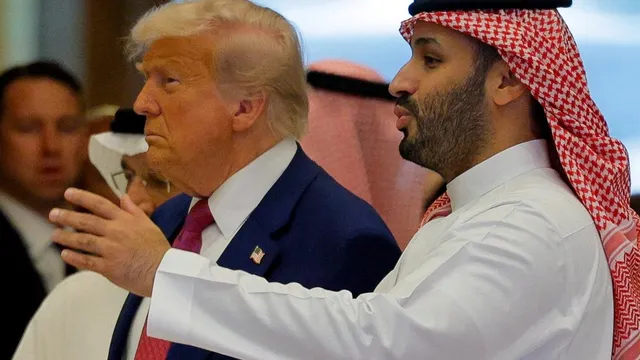
Trump secures $2 trillion in economic agreements during Middle East visit
2025-05-20 17:42- Donald Trump visited Saudi Arabia, Qatar, and the UAE to strengthen economic ties.
- The trip resulted in over $2 trillion in investment agreements from Gulf nations.
- This engagement aims to enhance U.S. foreign relations and energy security in the region.
Express your sentiment!
Insights
In May 2025, Donald Trump undertook a significant diplomatic trip to the Middle East, marking his first major overseas visit during his second term as president. The trip included meetings with leaders from Saudi Arabia, Qatar, and the United Arab Emirates, where he aimed to strengthen economic ties and secure investment agreements. The White House reported that these negotiations culminated in commitments exceeding $2 trillion in investments aimed at bolstering the U.S. economy and enhancing partnerships in the region. The visit saw substantial commitments from Saudi Arabia, which pledged $600 billion over four years. Additionally, Qatar agreed to various deals including a $1.2 trillion economic exchange and a plan to modernize its military capabilities by purchasing drone aircraft. At the same time, the UAE announced commitments that could lead to hundreds of billions in new commercial agreements. Trump's administration underscored the importance of these economic partnerships to reduce dependency on foreign oil and energize the U.S. economic landscape once again. During his speeches, Trump emphasized a new doctrine of U.S. engagement focused on energy and commerce, aiming to transform American foreign policy in the region. He articulated a vision of cooperation among Gulf states, encouraging them to set aside differences for mutual economic benefit and to pursue peace, particularly in relation to Iran's nuclear program. Moreover, he highlighted the need to take a firm stance against Iran, suggesting that if negotiations for a nuclear deal fail, the U.S. would impose significant sanctions. Despite the positive developments, questions arose about the implementation and longevity of these agreements. Experts expressed concerns over whether the Trump administration could effectively follow through on its ambitious commitments and navigate the complex dynamics within the region, especially given Trump's past approaches to foreign diplomacy. The outcomes of these engagements could influence U.S. standing in the Middle East, as well as the geopolitical landscape as a whole.
Contexts
The current U.S. relations with Saudi Arabia are complex, influenced by a blend of geopolitical, economic, and social factors. Historically, the U.S. has maintained a strong alliance with Saudi Arabia, primarily due to the Kingdom's significant oil reserves and strategic location in the Middle East. This relationship was initially founded on mutual interests: the U.S. secured a consistent oil supply while providing military protection and political support to the Saudi monarchy. However, this partnership has faced challenges in recent years, particularly due to shifting power dynamics in the region, rising anti-American sentiments in some sectors, and debates within the U.S. regarding arms sales and human rights issues in Saudi Arabia. The delicate balance that defines this relationship continues to evolve in response to both countries' domestic and foreign policies. One of the critical components influencing U.S.-Saudi relations is the ongoing conflict in Yemen, where Saudi-led military operations have drawn widespread international criticism for humanitarian impact. The U.S. has faced pressure to reassess its military assistance to Saudi Arabia, particularly concerning arms sales tied to the conflict. Senators and activists have raised concerns regarding the ethical implications of supporting a nation involved in such a devastating humanitarian crisis. Additionally, issues surrounding human rights violations, including the treatment of dissidents and women’s rights within Saudi Arabia, have further complicated the bilateral ties and raised questions among lawmakers demanding a reevaluation of U.S. support. Despite these challenges, economic ties between the U.S. and Saudi Arabia remain robust. The Kingdom is one of the largest foreign investors in the U.S., pouring billions into various sectors, including technology and real estate. The Vision 2030 initiative launched by Crown Prince Mohammed bin Salman aims to diversify the Saudi economy away from oil dependency, creating opportunities for U.S. companies to engage in sectors like entertainment, tourism, and technology. Both nations share an interest in stabilizing oil markets, particularly amid fluctuating global oil prices, which have remained a focal point of their economic discussions. The resilience of these economic ties is a strong force keeping U.S.-Saudi relations afloat despite political disagreements. In summary, the U.S.-Saudi relationship is characterized by significant cooperation on issues ranging from energy security to regional stability, yet it is continually tested by geopolitical tensions, ethical considerations regarding military support, and the evolving landscape of public opinion. Maintaining this partnership requires careful navigation of conflicting interests, as both countries strive to address not only their mutual security concerns but also the shifting dynamics of the global economy and regional politics. As of May 2025, the relationship continues to be crucial for both nations, with ongoing dialogues aiming to address the complexities of their alliance while seeking to innovate economically and politically.